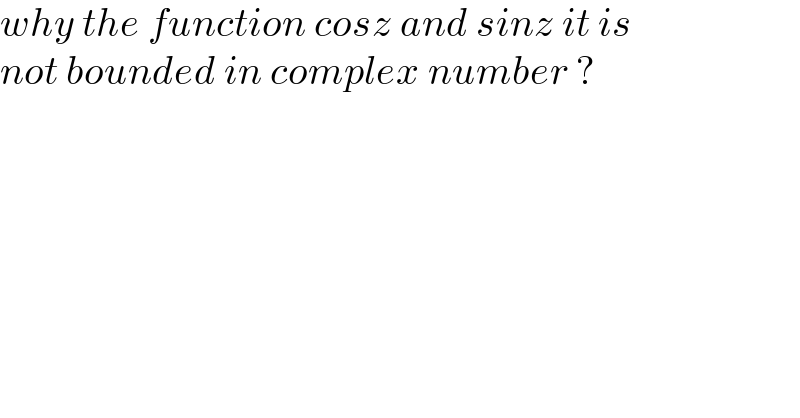Question Number 134419 by mohammad17 last updated on 03/Mar/21

$${why}\:{the}\:{function}\:{cosz}\:{and}\:{sinz}\:{it}\:{is}\: \\ $$$${not}\:{bounded}\:{in}\:{complex}\:{number}\:? \\ $$
Answered by Olaf last updated on 03/Mar/21

$$\mathrm{cos}{z}\:=\:\mathrm{cos}\left({x}+{iy}\right) \\ $$$$\mathrm{cos}{z}\:=\:\mathrm{cos}{x}\mathrm{cos}\left({iy}\right)−\mathrm{sin}{x}\mathrm{sin}\left({iy}\right) \\ $$$$\mathrm{cos}{z}\:=\:\mathrm{cos}{x}\frac{{e}^{{i}\left({iy}\right)} +{e}^{−{i}\left({iy}\right)} }{\mathrm{2}}−\mathrm{sin}{x}\frac{{e}^{{i}\left({iy}\right)} −{e}^{−{i}\left({iy}\right)} }{\mathrm{2}{i}} \\ $$$$\mathrm{cos}{z}\:=\:\mathrm{cos}{x}\frac{{e}^{−{y}} +{e}^{{y}} }{\mathrm{2}}−\mathrm{sin}{x}\frac{{e}^{−{y}} −{e}^{{y}} }{\mathrm{2}{i}} \\ $$$$\mathrm{cos}{z}\:=\:\mathrm{cos}{x}\mathrm{cosh}{y}+{i}\mathrm{sin}{x}\mathrm{sinh}{y} \\ $$$$\mathrm{cos}{z}\:\mathrm{is}\:\mathrm{not}\:\mathrm{bounded}\:\mathrm{because} \\ $$$$\mathrm{cosh}{y}\:\mathrm{and}\:\mathrm{sinh}{y}\:\mathrm{are}\:\mathrm{not}\:\mathrm{bounded}. \\ $$$$ \\ $$$$\mathrm{Same}\:\mathrm{demonstation}\:\mathrm{for}\:\mathrm{sin}{z}. \\ $$$$ \\ $$
